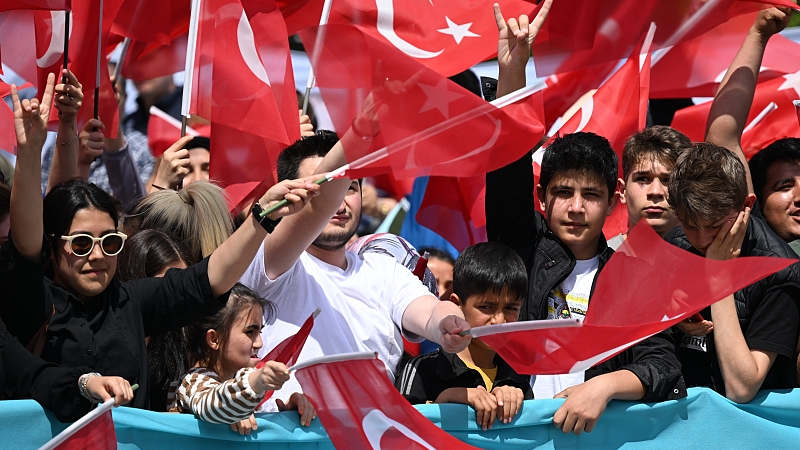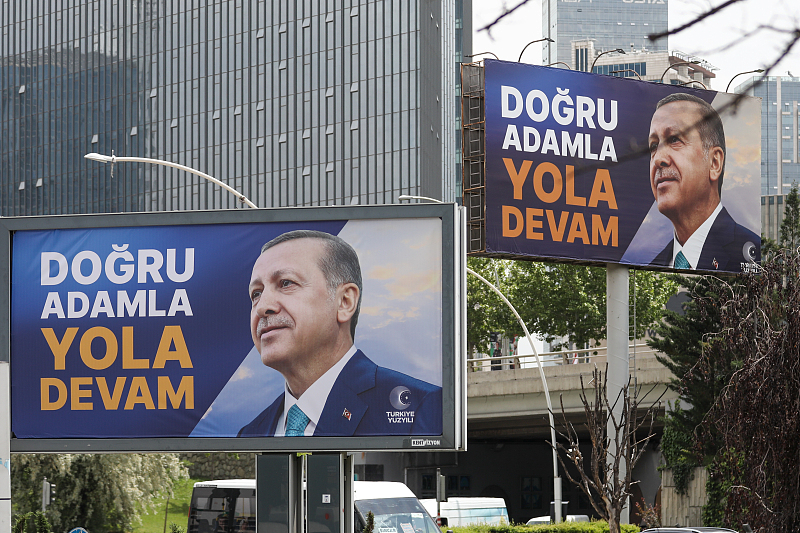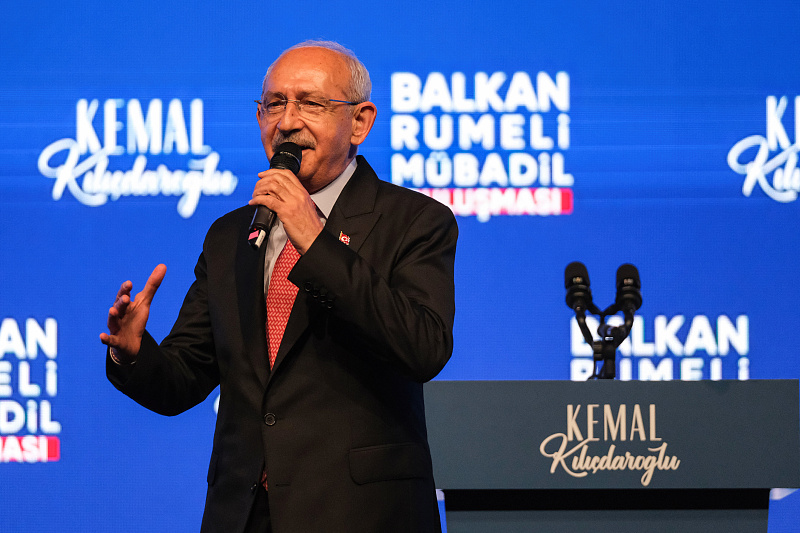
Supporters of Turkish President Recep Tayyip Erdogan attend a rally ahead of the presidential runoff vote, Ankara, Türkiye, May 27, 2023. /CFP
Supporters of Turkish President Recep Tayyip Erdogan attend a rally ahead of the presidential runoff vote, Ankara, Türkiye, May 27, 2023. /CFP
Turkish President Recep Tayyip Erdogan and the opposition candidate Kemal Kilicdaroglu sought to build on their momentum going into Sunday's runoff presidential election, urging Turks to vote as neither candidate reached the 50% threshold needed to win outright in the first round of voting on May 14.
Erdogan, 69, defied opinion polls and came out on top, gaining 49.5% of the vote in the presidential race compared with 44.9% for his challenger in the first round. But he fell just short of the 50% needed to avoid a runoff on May 28, in a race with profound consequences for Türkiye itself and global geopolitics.
Erdogan is Türkiye's longest-serving leader and held the position of prime minister from 2003 until 2014, after which he was elected president. His ruling Justice and Development Party (AKP) has just won a parliamentary majority with the help of his nationalist partner, the Nationalist Movement Party.
Erdogan has garnered strong support from electors and a comfortable majority in parliament. And he got a boost earlier this week when Sinan Ogan, a nationalist politician who came third with 5.2%, endorsed him. The current figure shows that Erdogan is taking a leading position and is favored to win for five more years.
Kilicdaroglu, 74, is the candidate of a six-party opposition alliance and leads the Republican People's Party (CHP) created by Türkiye's founder Mustafa Kemal Ataturk. His camp has struggled to regain momentum after the shock of trailing Erdogan in the first round.
Kilicdaroglu promised to return to orthodox economic policies from Erdogan's unconventional method of taming high inflation with interest rate cuts. He also favors a more Western-friendly foreign policy than Erdogan, who has established close ties with Russia despite its NATO allies' criticism.

Posters of Turkish President and Justice and Development Party (AKP) leader Recep Tayyip Erdogan are seen on election campaign billboards, Ankara, Türkiye, May 26, 2023. /CFP
Posters of Turkish President and Justice and Development Party (AKP) leader Recep Tayyip Erdogan are seen on election campaign billboards, Ankara, Türkiye, May 26, 2023. /CFP
A decisive run-off
Sunday's election will decide not only who leads Türkiye, a NATO-member country of 85 million, but also how it is governed, where its economy is headed after its currency plunged to one-tenth of its value against the dollar in a decade, and the shape of its foreign policy, which has seen Türkiye irk the West by cultivating ties with Russia and Gulf states.
During Erdogan's presidency, the Turkish lira, which has devalued steadily in recent years, including halving in value in one year alone, dropped close to a historic low. And by taking an unorthodox monetary policy, the incumbent president is now leaning heavily on the central bank to hold down rates, which has contributed to rising inflation and the increasing cost of food and other basic goods.
According to the Turkish Inflation Research Group (ENAG), which measures inflation on a basket of goods and services, prices recorded a 105.19% increase last month on the previous year, adding that prices were up by almost a third compared with the beginning of 2023.
Some economists have said that Türkiye's financial woes may deepen in the event of Erdogan's reelection.
"After May 28, it will not be possible to contain the appreciation of the dollar against the lira, we should brace for more turmoil," economist Alaattin Aktas wrote in his column in the Turkish online daily Ekonomim earlier this month, adding that Türkiye's public and private annual external debt has increased to $203 billion, warning that the weakening of the lira would pose additional challenges to the economy.
Kilicdaroglu has long condemned Erdogan's policy of low interest rates during the presidential campaign. In a video posted on Twitter on Tuesday, Kilicdaroglu called on voters to save Türkiye from "economic ruin." He also released a video last month stating: "Now, one kilogram of onions (a staple in Turkish cuisine) is 30 liras; if (Erdogan) stays, it will be 100 liras."
The opposition candidate has pledged to bring back conventional economic policies, including rational interest rates, to fight crippling hyperinflation in the country. He also said he will work to attract as much as $300 billion in foreign investment for Türkiye as he works to create a country manufacturing high-value products, and he will ban home sales to foreign citizens until Türkiye's housing crisis, pushed by high inflation, earthquakes and other factors, is settled for Turks.

Kemal Kilicdaroglu, chairman of the Republican People's Party and the opposition presidential candidate, seen speaking during a meeting, Istanbul, Türkiye, May 26, 2023. /CFP
Kemal Kilicdaroglu, chairman of the Republican People's Party and the opposition presidential candidate, seen speaking during a meeting, Istanbul, Türkiye, May 26, 2023. /CFP
Nationalists seem to be winning out
However, widespread concern about a cost of living crisis did not drive away support for Erdogan at the polls. Erdogan's supporters say a vote for him is a vote for stability. During his election campaign, Erdogan underlined the necessity for strong leadership to maintain the country's unity and stability in a volatile region.
"We can manage economic challenges, we will overcome problems, but without Erdogan, the independence of our nation will be at stake," said Baki Aslan, a middle-aged grocery shop employee.
Erdogan has consistently pursued sharp rhetoric against "terrorist" groups such as the Kurdistan Workers' Party (PKK) throughout the campaigning period. He claimed that his government would continue crushing these groups with determination.
He also promised to return some one million Syrian refugees to their homeland, saying improving dialogue between Syria and Türkiye through Russian mediation efforts will help increase the "voluntary" return of refugees.
According to official numbers, Türkiye now hosts 3.4 million Syrian refugees. Compared with his competitor Kilicdaroglu, who said he would send refugees back to their homeland in two years through an agreement with the Syrian government, Erdogan didn't give a specific timeline for his repatriation plan.
After Kilicdaroglu's announcement of repatriating immigrants, another nationalist, Umit Ozdag, leader of the anti-immigrant Victory Party (ZP), declared ZP's support for Kilicdaroglu. The ZP won 2.2% of the votes in this month's parliamentary election.
A closely watched survey by pollster Konda for the runoff put support for Erdogan at 52.7% and Kilicdaroglu at 47.3% after distributing undecided voters. The survey was carried out on May 20-21, before Ogan and Ozdag revealed their endorsements.
Another key is how Türkiye's Kurds, about a fifth of the population, will vote. The pro-Kurdish Peoples' Democratic Party (HDP) endorsed Kilicdaroglu in the first round but, after his lurch to the right to win nationalist votes, it did not explicitly name him and urged voters rather to reject Erdogan in the runoff.
Polls will open at 8 a.m. (0500 GMT) and close at 5 p.m. (1400 GMT). By late Sunday, there should be a clear indication of the winner.
"Türkiye has a longstanding democratic tradition and a longstanding nationalist tradition, and right now it's clearly the nationalist one that's winning out," said Nicholas Danforth, Türkiye historian and non-resident fellow at think tank ELIAMEP.
(With input from agencies)